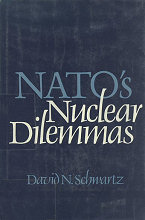
SCHWARTZ : NATO's nuclear dilemmas (fülszöveg)
Almost from its inception, the North Atlantic Treaty Organization has been plagued by controversies over the proper role of nuclear weapons in alliance defense strategy. NATO has largely relied on U.S. strategic nuclear forces, bolstered by U.S. nuclear weapons based in Europe, to deter Warsaw Pact aggression. Yet the European allies have variously feared that the United States might not make good on its nuclear guarantee or, contrariwise, might do so and plunge them into a nuclear and final catastrophe.
In part to alleviate these fears, the United States proposed several important initiatives during the critical 1957–67 period: the offer of Thor and Jupiter intermediate-range ballistic missiles to the allies; plans to establish a mobile, land-based medium-range missile force for NATO; the creation of a multilateral nuclear force; the adoption by NATO of the doctrine of flexible response; and the formation of the NATO Nuclear Planning Group. David N. Schwartz analyzes each of these initiatives in turn, showing why the United States proposed it, why the Europeans reacted as they did, and why the initiative either succeeded or failed. His final chapter deals with events leading up to the NATO decision in 1979 to modernize its long-range theater nuclear forces and to pursue arms-control negotiations with the Soviet Union on limiting these weapons. Schwartz compares this initiative with the earlier ones, suggesting that, though advances have been made, the lessons of the past have not all been learned. And the nuclear dilemmas facing the alliance, regarding the credibility of the nuclear guarantee and the more general role of nuclear weapons in NATO's defense posture, still remain.